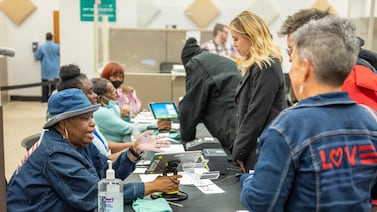Votebeat is a nonprofit news organization reporting on voting access and election administration across the U.S. Sign up for Votebeat Michigan’s free newsletter here.
Update, Nov. 21, 2025: Muhith Mahmood, the candidate who lost the Hamtramck mayoral election by six votes, has requested a recount. The Wayne County Clerk’s Office staff will recount the city’s more than 4,600 ballots by hand.
The Wayne County Board of Canvassers certified Adam Alharbi as the winner of Hamtramck’s mayoral election, after a turbulent post-election review that included a rejected batch of absentee ballots and an unusually high number of “cured” ballots.
Going into Tuesday’s canvassing meeting, Alharbi led City Council member Muhith Mahmood by 11 votes in unofficial results. After the board added 120 cured ballots to those totals, Alharbi won the official tally by only six votes — raising questions about whether the 37 ballots that were disallowed on Friday due to security concerns could have changed the outcome.
Cured ballots are absentee ballots that weren’t counted originally because either the signature on the envelope was missing or it did not match the signature on file. In these cases, the clerk’s office reaches out to the voter and gives them until the Friday after the election to correct it so their ballot can be counted. The 120 ballots that were cured in Hamtramck in this year’s election was an unusually high number; Detroit, which has more than 20 times the population, had only 72 cured ballots. It’s unclear why Hamtramck had so many cured ballots.
The canvas finalizes yet another controversial election in Hamtramck, a city of roughly 28,000 surrounded primarily by Detroit, but it’s likely not over yet. Recounts can be requested within 48 hours of the end of a canvass. Mahmood declined to comment Tuesday on whether he would request a recount. His attorney, Mark Brewer, said he would need to speak to his client.
Greg Mahar, Wayne County’s director of elections, noted Tuesday during the canvassers meeting that four of the city’s five absentee precincts did not balance, meaning the number of ballots tallied in the initial count did not match the number of ballots recorded on the voter rolls as having been cast. That’s unusual: 99% of early and Election Day ballots outside of Detroit either were balanced or explained, Mahar said.
Lisa Capatina, chair of the board, told the crowded meeting room Tuesday that the attorney general’s and secretary of state’s offices “are aware” of the concerns people had around the election.
Those concerns include the disenfranchisement of 37 absentee voters whose ballots were mistakenly left on a desk in the clerk’s office on election night. Three city officials entered the office late that night while the ballots were sitting out, breaking the chain of custody for those ballots, officials argued. Maintaining the chain of custody is a critical safeguard for a fair election, as it ensures that ballots have not been tampered with.
Hamtramck City Clerk Rana Faraj has also been on leave since Nov. 10, a move she said was for her own safety, although it’s not clear what that meant. Other city officials have not provided additional information. She was not back in her office Tuesday.
Other recent elections in Hamtramck have also been marred by controversy. Six people, including four council members, were named in a petition from Attorney General Dana Nessel as allegedly having assisted in election crimes during the city’s last local election in 2023.
The petition alleged those council members — Mohammed Hassan, Muhtasin Sadman, Mohammed Alsomiri, and Abu Musa — and two others conspired to collect unvoted absentee ballots from newly naturalized citizens and fill them out with their chosen candidates.
Hassan and Sadman were charged with felonies in August, although Sadman’s felony charges were later dropped after subpoenaed witnesses did not appear in court. Sadman still faces a misdemeanor charge and is set for a pretrial hearing next month; Hassan is set to face a jury in April, according to court records. No one else has been charged.
Musa and Nayeem Choudhury, one of the others named in Nessel’s petition, both won seats on the council in the 2025 election, as confirmed Tuesday by the finalized canvas. Musa’s victory came despite new accusations of wrongdoing. Just before the August primary, footage from surveillance cameras appeared to show Musa allegedly handing a driver bundles of ballots to place into a city drop box. Michigan law allows only family members or those in the same household to return ballots for voters.
Hayley Harding is a reporter for Votebeat based in Michigan. Contact Hayley at hharding@votebeat.org.






